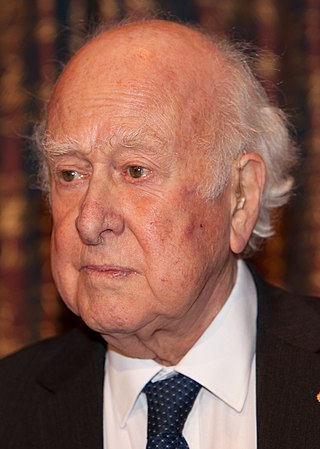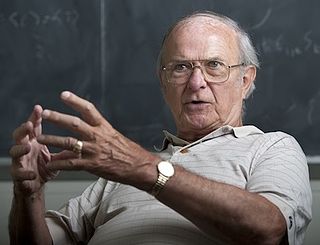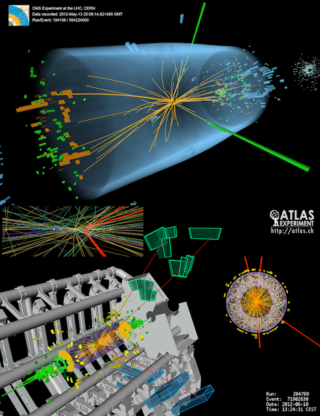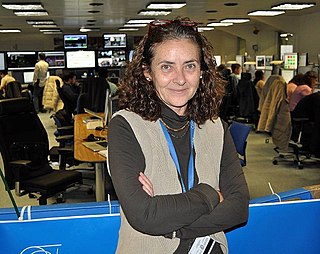Related Research Articles

Peter Ware Higgs was a British theoretical physicist, professor at the University of Edinburgh, and Nobel laureate in Physics for his work on the mass of subatomic particles.

The Large Hadron Collider (LHC) is the world's largest and highest-energy particle accelerator. It was built by the European Organization for Nuclear Research (CERN) between 1998 and 2008 in collaboration with over 10,000 scientists and hundreds of universities and laboratories across more than 100 countries. It lies in a tunnel 27 kilometres (17 mi) in circumference and as deep as 175 metres (574 ft) beneath the France–Switzerland border near Geneva.

The Large Electron–Positron Collider (LEP) was one of the largest particle accelerators ever constructed. It was built at CERN, a multi-national centre for research in nuclear and particle physics near Geneva, Switzerland.

Lisa Randall is an American theoretical physicist and Frank B. Baird, Jr. Professor of Science at Harvard University. Her research includes the fundamental forces of nature and dimensions of space. She studies the Standard Model, supersymmetry, possible solutions to the hierarchy problem concerning the relative weakness of gravity, cosmology of dimensions, baryogenesis, cosmological inflation, and dark matter. She contributed to the Randall–Sundrum model, first published in 1999 with Raman Sundrum.

Jonathan Richard "John" Ellis is a British-Swiss theoretical physicist.

François, Baron Englert is a Belgian theoretical physicist and 2013 Nobel Prize laureate.

Carl Richard Hagen is a professor of particle physics at the University of Rochester. He is most noted for his contributions to the Standard Model and Symmetry breaking as well as the 1964 co-discovery of the Higgs mechanism and Higgs boson with Gerald Guralnik and Tom Kibble (GHK). As part of Physical Review Letters 50th anniversary celebration, the journal recognized this discovery as one of the milestone papers in PRL history. While widely considered to have authored the most complete of the early papers on the Higgs theory, GHK were controversially not included in the 2013 Nobel Prize in Physics.

Robert Brout was an American-born Belgian theoretical physicist who made contributions in elementary particle physics. He was a professor of physics at Université Libre de Bruxelles where he created, together with François Englert, the Service de Physique Théorique.

The Higgs boson, sometimes called the Higgs particle, is an elementary particle in the Standard Model of particle physics produced by the quantum excitation of the Higgs field, one of the fields in particle physics theory. In the Standard Model, the Higgs particle is a massive scalar boson with zero spin, even (positive) parity, no electric charge, and no colour charge that couples to mass. It is also very unstable, decaying into other particles almost immediately upon generation.

Fabiola Gianotti is an Italian experimental particle physicist who is the current and first woman Director-General at CERN in Switzerland. Her first mandate began on 1 January 2016 and ran for a period of five years. At its 195th Session in 2019, the CERN Council selected Gianotti for a second term as Director-General. Her second five-year term began on 1 January 2021 and goes on until 2025. This is the first time in CERN's history that a Director-General has been appointed for a full second term.
Joseph Incandela is an American particle physicist, a professor of physics at the University of California, Santa Barbara and currently based at CERN, where he spent two years as the spokesperson for the Compact Muon Solenoid experiment at the Large Hadron Collider.

Guido Tonelli is an Italian particle physicist who was involved with the discovery of the Higgs boson at the Large Hadron Collider. He is a professor of General Physics at the University of Pisa (Italy) and a CERN visiting scientist.

Sir Tejinder Singh Virdee,, is a Kenyan-born British experimental particle physicist and Professor of Physics at Imperial College London. He is best known for originating the concept of the Compact Muon Solenoid (CMS) with a few other colleagues and has been referred to as one of the 'founding fathers' of the project. CMS is a world-wide collaboration which started in 1991 and now has over 3500 participants from 50 countries.

Sau Lan Wu is a Chinese-American particle physicist and the Enrico Fermi Distinguished Professor of Physics at the University of Wisconsin-Madison. She made important contributions towards the discovery of the J/psi particle, which provided experimental evidence for the existence of the charm quark, and the gluon, the vector boson of the strong force in the Standard Model of physics. Recently, her team located at the European Organization for Nuclear Research (CERN), using data collected at the Large Hadron Collider (LHC), was part of the international effort in the discovery of a boson consistent with the Higgs boson.

Particle Fever is a 2013 American documentary film tracking the first round of experiments at the Large Hadron Collider (LHC) near Geneva, Switzerland. The film follows the experimental physicists at the European Organization for Nuclear Research (CERN) who run the experiments, as well as the theoretical physicists who attempt to provide a conceptual framework for the LHC's results. The film begins in 2008 with the first firing of the LHC and concludes in 2012 with the successful identification of the Higgs boson.
Mayda Velasco is a physicist and professor in the Department of Physics and Astronomy at Northwestern University. She works in experimental particle physics and is a leading member of the CMS Collaboration at the CERN LHC. She founded COFI and is its first director. She is a pioneer in the physics potential of photon colliders.
Natural Cycles is a mobile app designed to help women track their fertility. The app predicts the days on which a woman is fertile and may be used for planning pregnancy and contraception. It was developed by scientist Elina Berglund, who founded the company with her husband, Raoul Scherwitzl.

Torsten Åkesson, is a Swedish physicist and professor in Particle physics at Lund University who is a member of the Royal Swedish Academy of Sciences and was president of the CERN Council.

Victoria Jane Martin is a Scottish physicist who is Professor of Collider Physics at the University of Edinburgh. She works on the ATLAS experiment on the Higgs boson.

Teresa Rodrigo Anoro was a Spanish scientist who worked in particle physics. She worked at CERN, Fermilab and the Instituto de Física de Cantabria and was professor at the University of Cantabria. Whilst at CERN, Rodrigo worked on the Compact Muon Solenoid and research for the Higgs boson.
References
- 1 2 Törneman, Beata (31 January 2016). "Elina Berglund" (in Swedish). Womengineer. Retrieved 19 December 2017.
- ↑ Lomas, Natasha (30 October 2014). "NaturalCycles Expands Its Contraception App Subscription Service In Europe". TechCrunch. Retrieved 19 December 2017.
- ↑ Saner, Emine. "Return of the rhythm method – how natural contraception went digital". The Guardian. Retrieved 11 December 2017.
- 1 2 Savage, Maddy (7 August 2017). "The Swedish physicist revolutionising birth control". BBC. Retrieved 20 December 2017.
- 1 2 Rito, Mimmi. "Idag vågar jag drömma stort" (in Swedish). Visma. Retrieved 20 December 2017.
- 1 2 "Once a physicist: Elina Berglund". IOP: Institute of Physics. Retrieved 19 December 2017.
- ↑ Elina Berglund Scherwitzl (19 January 2017). "From CERN to natural fertility". The Hippocratic Post. Retrieved 19 December 2017.
- ↑ Manthorpe, Rowland (9 February 2017). "Can an algorithm replace the pill? Natural Cycles app wants to do just that". Wired. Retrieved 20 December 2017.
- ↑ "Scheduling sex with an app". Financial Times. 4 November 2014. Retrieved 20 December 2017.
- ↑ "Svenske kärnfysikern blir först i världen med godkänd preventiv-app" (in Swedish). VA. 8 February 2017. Retrieved 20 December 2017.
- ↑ "The Women in Tech Foundation presents the WIT-award winners for 2015". MyNewsDesk. 6 March 2015. Archived from the original on 26 January 2020. Retrieved 20 December 2017.